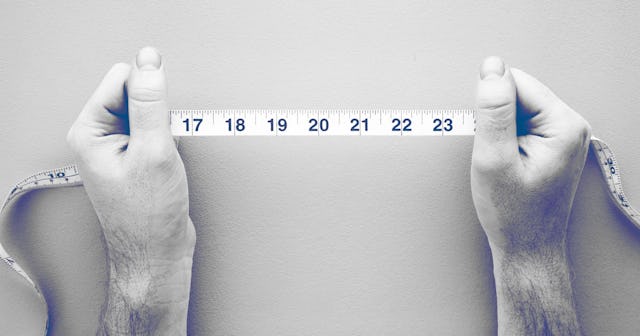My Son Struggles To Gain Weight, And Now We Need To Figure Out Why

I knew something was wrong the moment the pediatrician entered the exam room, a grim look on her face. Despite the mask covering her mouth and the face shield protecting her eyes, I knew she wasn’t smiling. And I knew why.
Before the pediatrician had had a chance to say even a single word, guilt was already blooming in my stomach. When she spoke, she only confirmed what I had already known on a subconscious level: my son hadn’t grown. In the year between his last well visit and this well visit, during this pandemic year, he had gained no weight, and had grown in height significantly less than his curve would suggest.
My son is nine. He’s been a picky eater since right around when he learned to say no. In my memory, that coincides with the time he discovered the joy of chocolate and gummy bears—but maybe that’s just my memory finding convenient connections. Either way, getting him to eat a vegetable has been a struggle for the better part of a decade.
He became an even pickier eater right around the time his father died—and food became just one way he tried to find a little bit of control in a world that was wholly out of his control. Some days, I could see that we were locked in a power struggle about eating dinner (even when that dinner plate was filled with foods he liked). And most days, I let him win. In those worst grief-stricken days, he needed a few wins.
But last year, he and I were ready to combat his picky eating. The grief wasn’t as dominating, and he was sick of eating the same few foods and beginning to understand the link between food and the energy he needed to keep up with his friends. I made him an appointment with a pediatric nutritionist who’d come highly recommended.
Then, a week before his appointment, the world shut down. COVID-19 brought everything to a grinding halt and I cancelled our appointment. The risk-benefit analysis was obvious—COVID was deadly and leaving the house was too risky. His poor eating habits could be tackled in a few weeks when the world opened up again. (Yes, in retrospect, my naivete is astounding.)
When things slowly reopened in the summer with safety measures in place, I decided not to reschedule his appointment. He was eating better. We were home all day and he was snacking all day. He understood that some of his favorite foods were sold out at grocery stores and impossible to find anywhere, and as a result, he was willing to branch out to try new foods. Somehow, when neither of us could control his food, he began to release that need to control. I was thrilled, and more importantly, he was proud of himself.
Dmitriy Protsenko/Getty
He was eating a few more fruits and vegetables, trying a few new proteins. There would still be days when persuading him to eat just a few bites of his dinner would take the better part of an hour, when he’d say he just wasn’t hungry, when he’d complain of a stomach ache that lasted only until his sister was eating dessert. But most days were good. At least I thought so until the pediatrician walked in and confirmed he’d gained no weight.
Now, we’re in the throes of a full-blown medical investigation to determine both whether there’s a physical reason behind why he’s not eating enough or whether he is eating enough but it’s not being processed by his body—whether there’s some underlying medical condition like celiac or a thyroid issue causing some malabsorption. We’ve gone to see a pediatric gastroenterologist. He’s had blood drawn.
And while he sat bravely in the patient chair as the lab technician took three vials of his blood, my mom guilt raged.
All I could think about was that canceled appointment nearly a year ago. All I could feel was guilt for letting things get this far—to the point where he’d failed to grow for an entire year. A part of me feels like I should have seen this—his failure to grow. Had I let myself become intentionally blind because there were so many other stressors in our pandemic-strained lives?
The logical part of my brain has a quick response. It tells me that he was eating better—I wasn’t imagining him eating meatballs and chicken nuggets, stealing an extra brussel sprout off his sister’s plate. I wasn’t imagining that meals had ceased being battlegrounds, or that he was happy and proud of himself for trying new foods. The logical part of my brain knows that if there is a medical condition underlying his lack of growth, I couldn’t have known and that’s the purpose of well visits—for a medical professional to spot issues I might not know to look for. Maybe working with a nutritionist would have made it easier to spot earlier—but maybe not. After all, there was a pandemic raging around us.
The heart of my guilt is this: I’m his mother and it’s my job to love, protect, and nurture him. And I feel like I failed, I feel like I missed something. But also, the heart of my truth is this: we’ll figure it out, he’ll start to grow, and when he looks back at this pandemic year, he will remember most of all that he was loved, protected, and nurtured.
This article was originally published on